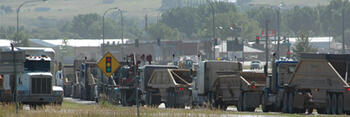However, the local transportation network is in crisis mode due to oil production in the region. The oil boom has been an economic boon to the region and the state, but it has also entailed daunting challenges. As recently noted in a recent article in Governing magazine:
Drilling each new well requires more than 2,000 truck trips, and the heavy rigs are destroying the roadways. “Simply put, the roads are falling apart in many cases,” says Alan Dybing, a researcher at the Upper Great Plains Transportation Institute, which estimates that fixing the roads will require an investment of more than $900 million over the next 20 years.”
 A solution that enables direct attribution of impact on county roads without enforcement by local law enforcement would be desirable. A minor solution has been proposed in which local law enforcement would get the revenue from enforcing weight limits, and that would be a good start. That proposal implicitly recognizes that the problems related to county road funding are closely related to a subset of users: heavy rigs. These users are causing severe impacts on the road network, and they are working in the industry that is most directly benefiting from the oil boom.
A solution that enables direct attribution of impact on county roads without enforcement by local law enforcement would be desirable. A minor solution has been proposed in which local law enforcement would get the revenue from enforcing weight limits, and that would be a good start. That proposal implicitly recognizes that the problems related to county road funding are closely related to a subset of users: heavy rigs. These users are causing severe impacts on the road network, and they are working in the industry that is most directly benefiting from the oil boom.My recommendation is that the State institute a tracking system for heavy rigs. Each rig would be registered and outfitted with a GPS device that would create a record of where it is traveling within the state. At nodes in which these rigs acquire or deposit material (i.e. water, oil, fracking liquid), an electronic record of that event would be created. These materials have known masses, which would make spot enforcement of individual rigs out on the road network a lower concern. The records would create a clear trail of rigs, weights, and routes. This activity could be tied to impact fees, which would be directly tied to the counties impacted by the activity. Because the Bakken extends over many counties in the western half of the state, and heavy rig traffic extends across the state, administration would optimally occur at the state level.
No comments:
Post a Comment